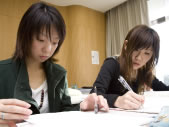Department of Human Sciences
The Department of Human Sciences answers the most essential question for humans; what are human beings? Based on a spirit of respect for people, we conduct interdisciplinary research on the social, educational and cultural environments around us using various scientific theories related to human beings.
Students can select studies according to their interests and future careers from a number of subjects divided into the five areas. These are Society, Welfare, Psychology and Education, Culture, and Ideology. In addition, the department offers seminars that enable interaction between teaching staff and students, experience-oriented experiments and training as well as a semester system.
The Department of Human Sciences emphasizes experience-based learning including experiments, practice, field work and study tours. We offer classes such as Social Research I to give an idea of current living conditions, and Social Research II to experience real conditions in the community. In addition, we also offer Psychological Experiments and Practices I/II, On-site Practice of Social Welfare Support Technology, Archeological Practice, and Folklore Practice. Students are qualified to take the social worker and psychiatric social worker (PSW) examinations on graduation if they earn the prescribed number of credits.
Students can select studies according to their interests and future careers from a number of subjects divided into the five areas. These are Society, Welfare, Psychology and Education, Culture, and Ideology. In addition, the department offers seminars that enable interaction between teaching staff and students, experience-oriented experiments and training as well as a semester system.
The Department of Human Sciences emphasizes experience-based learning including experiments, practice, field work and study tours. We offer classes such as Social Research I to give an idea of current living conditions, and Social Research II to experience real conditions in the community. In addition, we also offer Psychological Experiments and Practices I/II, On-site Practice of Social Welfare Support Technology, Archeological Practice, and Folklore Practice. Students are qualified to take the social worker and psychiatric social worker (PSW) examinations on graduation if they earn the prescribed number of credits.
Features of the Curriculum
Introduction to Human Science (1st year)
Students learn aspects of human science such as origin, history and process as well as the current situation and issues in our country, and consider challenges that people living in the 21st Century face such as earth resources, energy, environment and population.
Welfare for the Disabled Persons A/B(2nd year)
Students acquire a better understanding of welfare for the disabled and their needs by comprehending disabilities from the viewpoint of those living in the community. In addition, students gain a better understanding of the role and current situation of private sector activities and services, and how to cooperate with associated areas.
Environmental Ethics(2nd year)
The 21st century is known as the century of the environment. Environmental ethics is a new field of study created to review the relationship of humans with nature and the environment, and to study the new ethical rules needed in a time when the global ecosystem is said to be in danger. Students learn about the current situation and issues of the environment.
Curriculum by Academic Year
Curriculum List / Department of Human Sciences
| First year | Second year | Third year | Fourth year | Credits to complete | ||
| Liberal Arts Subjects | Liberal Arts Curriculum | At least 24 credits | ||||
| Main Subjects | Basics of Human Sciences Seminar A/B (2 each) Basic Theory of Human Sciences (2) |
Basics of Human Sciences Seminar C (2) | Specialized Seminar A/B (2 each)* | Graduate Thesis (6) | Must complete 18 credits in 7 subjects | |
| Basic Subjects | Lecture Subjects | Human Sciences and Ethics (2) History of Human Rights and Thought (2) Modern Society Theory (2) Lifestyle Structure Theory A/B (2 each) Social Welfare Theory A/B (2 each) Developmental Psychology A/B (2 each) Children’s Rights and Education (2) Modern Learning Theory (2) Japanese Social History A/B (2 each) Archeology A/B (2 each) Folkloristics A/B (2) |
Must select at least 10 credits from lecture subjects |
|||
| Philosophical Anthropology (2) | ||||||
| Disability Studies (2) | ||||||
| Special Lecture on Anthropology (2)* | ||||||
| Research Methods and Practical Courses | Social Studies Methods (2), Fieldwork (4) | Must select at least 2 credits from research methods and practical courses | ||||
| Outdoor Environmental Practice (2) Psychology Research Methods A (Experiments and Research Methods) (2) Psychology Research Methods B (Psychological Statistics) (2) Psychology Experiments and Practice I (2) Psychology Experiments and Practice II (2) Archeology Research Methods (2) History Research Methods (2) Folkloristics Research Methods (2) |
Archeology Practice (2) | |||||
| Domain Subjects | Sociology | Gender Sociology (2) Social Anthropology (2) |
||||
| Regional Sociology (2) Family Sociology (2) Industrial Sociology (2) Educational Sociology (2) Mass Media Theory (2) |
||||||
| Welfare | Welfare Theory for the Disabled (2) Welfare Theory for the Aged A/B (2 each) Welfare Theory for Children (2) Judicial Welfare Theory (2) Special Welfare Theory for Children (2) Regional Welfare Theory A/B (2 each) Public Dependency Theory (2) Medical Welfare Theory (2) Social Security Theory A/B (2 each) |
|||||
| Psychology and Education | Pathology for Disabled Children (2) | |||||
| Cognitive Psychology (2) | Personality Theory (2) Educational Psychology A/B (2 each) Psychiatry (2) General Psychiatric Theory (2) |
|||||
| Social Psychology A/B (2 each) Curriculum Theory (including instructional methods for special activities) (2) Educational Methodology (2) General Health Education Theory (2) Psychology for the Mentally Disabled (2) Physiology and Pathology for the Mentally Disabled (2) Psychology, Physiology and Pathology for the Orthopedically-impaired (2) Education Theory for Developmental Disabilities (2) Education Theory for the Visually Impaired (2) Education Theory for the Hearing Impaired (2) Education Theory for People with Multiple Handicaps (2) Education Theory for Language Impairments (2) Special Lecture on Psychology A/B (2 each) Educational Theory for the Disabled/Disabled Children (2) |
||||||
| General Special Needs Education Theory (2) Special Needs Education Theory I (Coordinator Theory) (2) Special Needs Education Theory II (IEP Theory) (2) |
||||||
| Culture | General Cultural History (2) Ainu History (2) Hokkaido History Research A/B (2 each) |
|||||
| Asian Social History (2) | ||||||
| UK and US Social Research A (2) UK and US Social Research B (2) |
||||||
| Oral History and Oral Literature Theory (2) Cultural Dynamics (2) Regional Cultural History (2) General Cultural Asset Theory (2) History and Culture of the North (2) |
||||||
| Cultural History Problems (2)* | ||||||
| Thought | Bioethics (2) Environmental Ethics (2) Modern Thought A/B (2 each) Japanese Thought (2) Humans and Literature (2) Humans and Religion (2) |
|||||
| Elective Courses | Education Media Theory for the Visually and Hearing Impaired (2) General Museum Theory (2) Museum Education Theory (2) Museum Information and Media Theory (2) Basics of Counseling Aid and Specialists I (2) |
General Medicine (2) Social Welfare Practice II (4) Welfare Administration and Welfare Planning (2) Welfare Administration Management (2) Social Welfare Practical Training (6) Social Welfare Practical Training Instruction (3) Occupational Support Methods (2) Rights Protection and the Adult Guardian System (2) Special Needs Education Practical Training (3) |
||||
| Intellectual Disability Education I (2) Intellectual Disability Education II (2) Orthopedically-impaired Education I (2) Orthopedically-impaired Education II (2) Education for the Sick (2) |
||||||
| Basics of Counseling Aid and Specialists II (2) General Social Work Theory A/B (2 each) Social Work Methodology A/B (2 each) Social Welfare Practice I (4) Mental Health Studies (4) Mental Health Welfare Theory (6) General Lifelong Learning Theory A/B (2 each) |
Social Welfare Practice III (2) | |||||
| Total from specialized subjects | At least 80 credits | |||||
| Total | At least 124 credits | |||||
Parenthesises indicate the number of credits
*Overlapping registration is permitted for courses with an asterisk (Special Lecture on Anthropology, Cultural History Problems and Specialized Seminar A/B)
Philosophy
The pursuit of comprehensive human science through cooperation with other fields of study.
Educational Goals
- Equip each student with a comprehensive knowledge of humans and human activities based on systematic learning centered around individual fields of science related to humans, human society and culture.
- Provide materials and a sense of excitement that will contribute to the creation of values for students to be able to build up humane relationships with others.
- Aim to link the reality of the local community (Hokkaido in our case) with students' academic pursuits to cultivate academic skills and motivate them to contribute to the welfare of the local community and the advancement of cultures with a sense of deep understanding and love.
- Pay due attention to the knowledge, skills and qualifications required after graduation.



